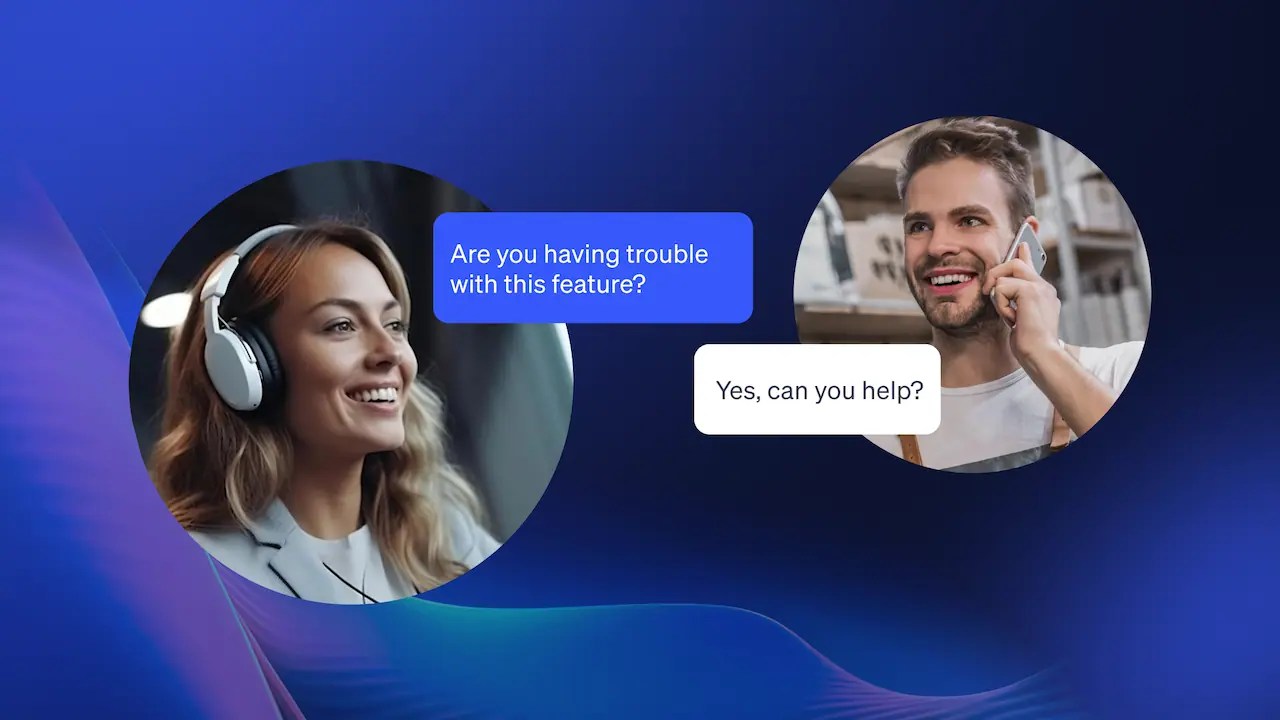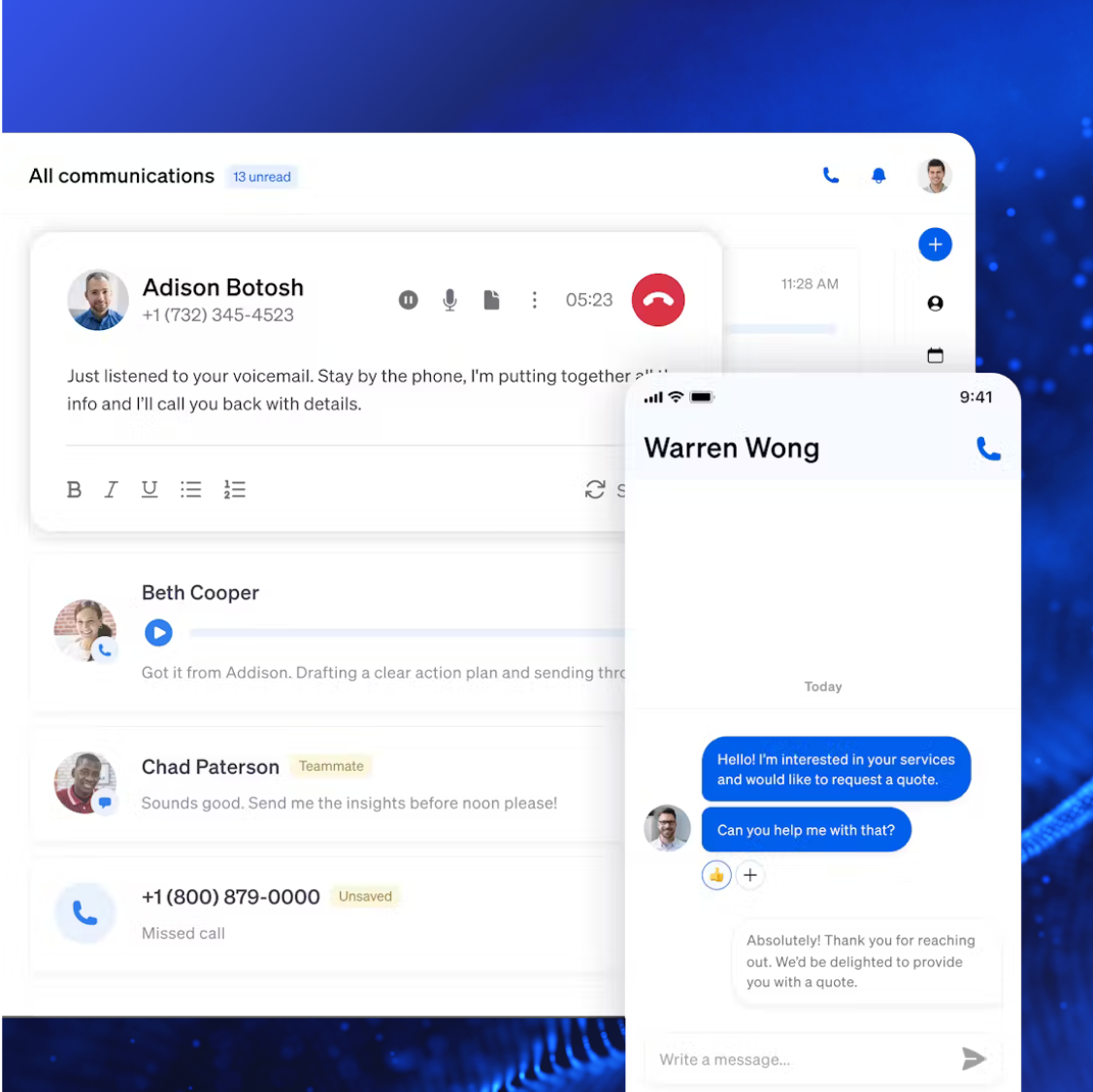Automation has reshaped the way we work. When monotonous, time-consuming tasks can be done instantly without employees needing to do more than push a button, the transformative effect of automation cannot be denied.
It can significantly improve efficiency, employee satisfaction, and customer service, but organizations must understand what tasks should be automated and how.
One of the most common and helpful uses for automation is improving the customer experience. Automation helps even the playing field, allowing small, agile support teams to provide the same level of customer service as larger organizations by enabling them to automate customer interactions, so let’s look at what customer experience automation (CXA) is, the benefits it can bring, and some examples of CXA in action.
Watch Now: How AI & Automation Deliver Better Business Outcomes
From agent assist and knowledge management to process automation, discover how these innovations are reshaping the way businesses connect with customers.
What Is Customer Experience Automation (CXA)?
Customer experience automation (CXA) refers to the technology that automates personalized interactions between a business and its customers across various touchpoints. The use of automation is agnostic of any one specific communication channel.
Customer insights from various stages of the customer journey help automate steps throughout each brand or product interaction by informing businesses about customer preferences and behaviors.
CXA enables businesses to deliver this kind of personalized service on a large scale through websites, apps, social media, and other channels.
Unleash your team’s productivity with Nextiva’s shared management capabilities. Give teams access to customer interactions, history, and call transcriptions. See how it works.
Components of CXA
- Chatbots and virtual assistants. AI-powered chatbots and virtual assistants can handle many customer queries in real time, offering instant support and guidance without human intervention.
- Personalization engines. By leveraging AI and machine learning algorithms, these engines analyze customer data to deliver personalized content, recommendations and offers to individual customers.
- Automated customer support. CXA tools automate ticketing processes, email responses, and support workflows, ensuring customers receive timely and relevant assistance.
- Predictive analytics. By forecasting future customer behaviors and preferences, businesses can proactively address needs and preferences, enhancing satisfaction and loyalty.
- Customer journey mapping tools. These customer journey tools automate the tracking and analyzing of customer interactions and preferences, enabling businesses to tailor experiences accordingly.
- Customer relationship management. While CXA focuses on automating customer experiences, customer relationship management (CRM) systems primarily manage customer data and interactions, supporting sales and marketing efforts. Integrating live chat systems with CRM tools can enhance customer service by providing agents with customer history and context.

Top 7 Examples of Customer Experience Automation
It’s easy to understand the concept of CXA, but the variety of ways automation can be applied means organizations should consider multiple tools and solutions. Customer experience automation (CXA) covers the entire customer lifecycle, ensuring personalized and efficient service across every touchpoint.
We’ve collected seven excellent ways businesses can automate the customer experience and outlined the benefits automation provides:
1. Interactive voice response
An interactive voice response (IVR) system is an automated telephone system that uses a combination of prerecorded messages and speech recognition to engage with callers, provide and gather information, and direct callers to an appropriate agent if necessary.

For instance, if a Spanish-speaking customer calls for help with a product, the IVR system can direct you to a Spanish-speaking agent who is equipped to assist you.
IVR phone systems are typically implemented through your cloud contact center software. From there, you can customize the menu options and responses based on customer needs and common questions.
There are many benefits to implementing IVR technology, including:
- Streamlined call routing
- Reduced wait times
- Efficient routing of customers to the right agent or department
- An improved ability to enable customers to carry out basic tasks
- Enabling customer service agents to focus on complex issues and improve customer satisfaction
2. Chatbots and virtual assistants
Chatbots and virtual assistants go a step further than IVR systems by providing an interactive bot for customer interactions.

AI chatbots use machine learning and natural language processing to understand written queries. They then provide customers with basic information and solutions to their issues, enabling them to get help or find answers without needing to talk to a live agent.
You can deploy AI-powered chatbots on your website, mobile app, or social media platform to give customers the help they need when needed. However, customer service representatives remain crucial for handling complex issues, ensuring a seamless transition when advanced assistance is needed.
Benefits of chatbots and virtual assistants include:
- 24/7 customer support without any wait times
- Efficient handling of routine inquiries
- Freeing up of human agents to focus on more complex issues
3. Automated call distribution
Automated call distribution (ACD) is a call center software feature that routes incoming calls to the right agents. The system distributes calls based on caller ID, business hours, and support level.
Businesses using IVR can also use ACD to identify caller needs. To do this, set up ACD in your cloud contact center platform and create predefined routing criteria. These criteria can include agent skills, customer priority, or agent availability, allowing customer support agents to focus on complex inquiries and improve customer interactions.
Among the benefits of ACD are:
- Improved response times
- A better workload balance between agents
- Higher customer success and satisfaction rates
- Improved call handle time and first-call resolution rates

4. Customer self-service portals
Surveys have shown that customers want to troubleshoot issues without speaking to an agent, with 67% of customers preferring self-service. This is where customer self-service portals shine, as they provide a library of information and tools to guide customers through their queries at their own pace. Optimizing these portals is crucial for enhancing the entire customer journey.
Setting up a self-service portal includes developing a web page with all the information and tools customers will need to handle common queries. These tools include FAQ pages, knowledge bases, troubleshooting articles, and interactive customer service software.
Self-service portals should also be integrated with the cloud contact center to provide real-time updates and track common concerns.
The benefits of self-service portals include:
- Empowering customers to find solutions on their own
- Reducing the number of basic queries agents need to handle
- Creating a centralized source of troubleshooting and knowledge
5. Email automation
Email is an essential channel for customer communication. However, anyone who’s worked in an email-heavy environment knows how quickly unread messages can pile up.
Email automation can assist with this by automatically sending replies. These can range from simple “we have received your email” messages to automated responses to common inquiries.
Email automation is also a powerful tool for email marketing campaigns. It can quickly send pre-written messages for email campaigns to selected customers, making email automation a critical part of any marketing strategy. Marketing automation, in particular, plays a crucial role in lead generation and nurturing, enhancing the overall customer experience.

You can set up email automation via the email management tools in your cloud contact center software.
There are several benefits to email automation, including:
- Improved communication speed and customer engagement
- Consistent messaging across customers with helpful recommendations
- Quick replies to basic questions getting to agents
- Increased ability for agents to focus on more complex tasks
6. Analytics and reporting tools
Understanding your contact center’s key metrics and performance can provide insights into agent efficiency, customer satisfaction, and the overall health of your organization. As such, it’s essential to have analytics and reporting tools to identify these metrics and their interactions, which can provide valuable customer insights.
Tools that automatically analyze performance and provide reports can guide decision-making, find new insights, and identify rising trends.
IImplement analytics software to track and analyze customer interactions across channels. These real-time insights can refine your automation strategies and improve agent performance, ensuring customers get the best service possible.

7. Workforce management (WFM) automation
One of the most important ways to ensure contact center efficiency is to ensure your centers are properly staffed.
Workforce management (WFM) tools help with this by using historical data sources and predictive analytics to automate scheduling, predict call volumes, and manage staffing requirements, ultimately delivering an exceptional customer experience.
The benefits of workforce management automation include:
- Optimized staffing around holidays and vacations
- Reduced labor costs without too many being idle
- Improved ability to match agent availability to customer demand
Webinar: Delivering Business Outcomes With AI & Automation
From agent assist and knowledge management to process automation, discover how these innovations are reshaping the way businesses connect with customers.
Benefits of Customer Experience Automation
Now that you understand automating the customer experience and have learned several ways to implement it, we must look at its overall benefits. What can CXA provide to a business to improve customer satisfaction?
Improved efficiency
One of the most significant benefits of CXA is improved operational efficiency. Automation streamlines operations, provides customers with self-service options, and eliminates repetitive, time-consuming tasks.
These improvements allow agents to handle complex cases and automate customer interactions, improving overall contact center efficiency.
Enhanced customer satisfaction
Customer satisfaction is a top priority for contact centers, and automating the customer experience can help improve it.
Faster response times, personalized communications, and 24/7 support options (including self-service) can create a better overall experience, improving customer retention and increasing customer satisfaction.

Reduced operational costs
CXA is an investment that pays off quickly with the savings it creates. Automating routine tasks and optimizing resource allocation helps contact centers significantly reduce labor and operational costs, which can lower your business’s costs through targeted customer retention campaigns.
Data-driven insights
Good data is of the utmost importance to a contact center. Automated analytics and reporting can provide valuable insights into customer behavior and agent performance by visually representing agent performance and giving actionable insights to drive improvements.

Know the mood of prospects and customers. Get real-time alerts based on conversations that allow your team to see which customers need quick attention and act fast. Try Nextiva.
Best Practices When Setting Up Customer Experience Automation
The next step is setting up CXA for your contact center. Here are some key best practices to keep in mind when getting started.
Balance automation and the human touch
While AI technology and automation are excellent tools, a human touch is still essential. You need to ensure that automated systems augment human interactions rather than replace them.
Maintaining the human touch will help ensure a personalized and empathetic customer experience, key to customer satisfaction.
Design with the user in mind
Automation requires ease of use. Be sure to create intuitive, easy-to-use automated systems that can efficiently guide customers to the necessary information or assistance.
Integrate systems seamlessly
Your contact center needs to be streamlined, and staff should be able to access all the necessary tools to achieve optimal efficiency. Ensure all automated tools are fully integrated with other business systems – this will create a unified experience and keep operations running smoothly.

Incorporate personalization
A personalized touch goes a long way in customer service. Customer data can be used to personalize even automated interactions, which will make customers feel recognized and valued.
Test and iterate
Nothing is perfect from the start, and setting up CXA can take some time. Testing and refining automation systems are essential, so be sure to incorporate feedback to enhance and fine-tune your system’s effectiveness.
Act on customer feedback data
Customers know what they like, or they can at least tell you what doesn’t work for them. Be sure to regularly seek customer feedback to incorporate into the design and refinement of automated systems – this will help you improve the experience as you go.

Train agents effectively
Agents need to know how to use the tools available to them. Comprehensive training is recommended so that agents can get the most out of your automated systems.
Monitor performance
Customer experience data-based analytics can provide excellent insights into your contact center’s performance. Be sure to monitor your automated interactions and service metrics regularly to identify areas for improvement and ensure a consistently positive experience.
A good customer experience dashboard can provide insight into satisfaction levels to help you maintain customer loyalty and retention.
Plan carefully
Implementing automation solutions can be complex. Make sure you have a roadmap and allocate sufficient resources, including training, for a smooth rollout.
Prioritize privacy and security
Keeping personal and proprietary data secure is essential. You must strictly adhere to data privacy regulations and best practices when designing automated systems.
This is not only a requirement but will also help maintain customer trust.
Automation Made Simple with Nextiva

There’s no denying that CXA can have a major impact on a contact center. It can improve workflows, improve customer experience, and reduce agent churn.
With the right technology and best practices, CXA can supercharge your contact center.
And if you need “the right technology,” Nextiva is one of the best. Nextiva’s contact center solution is feature-rich, easy to use, and affordable for businesses of all sizes. It comes with all the necessary automation to provide a memorable customer experience.
Elevate every customer interaction.
Deliver exceptional customer experiences with Nextiva’s CX platform.















 Customer Experience
Customer Experience 







